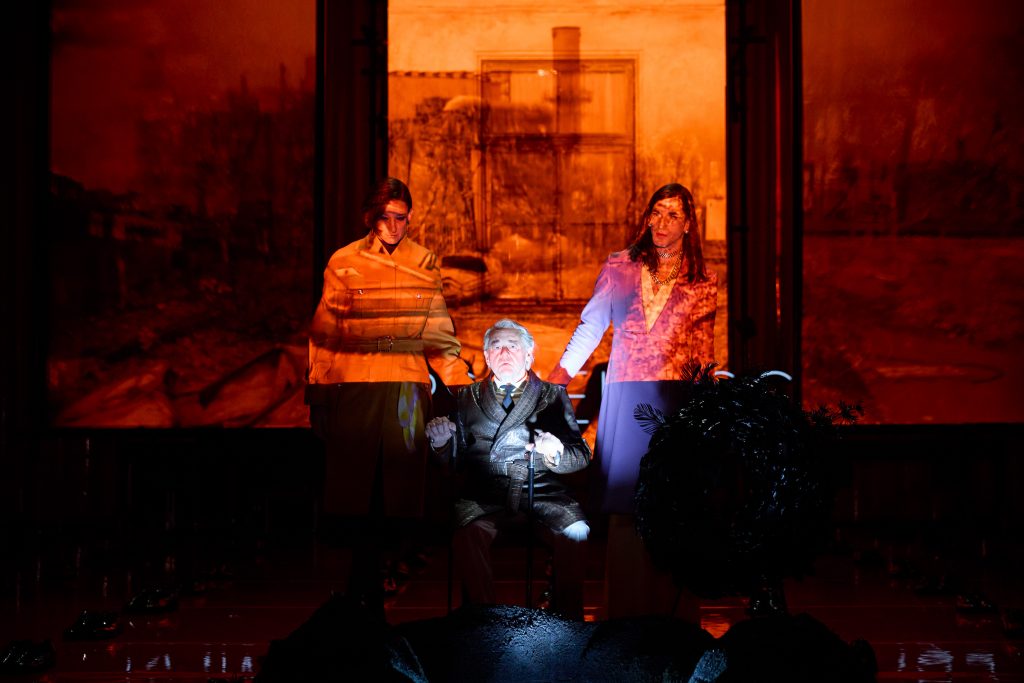When Thomas Bernhard’s last drama Heldenplatz (Heroes Square) premiered at the Burgtheater in Vienna on October 7, 1988, it caused a public uproar. Before the play was published, carefully selected extracts of the text had been leaked to various papers and, taken out of context, led to massive protests against the play. Austria’s president Kurt Waldheim, a former officer of the SA, called the drama an “insult to the Austrian people”, and Thomas Bernhard was physically assaulted for allegedly besmirching Austria’s reputation. Bernhard’s play led to a heated debate about Austria’s role in the Nazi era.

Courtesy of Judith Buss.
Heldenplatz had been commissioned by Claus Peymann, then artistic director of the Burgtheater, to be performed for the 100th anniversary of the theatre’s opening. It was also the 50th anniversary of the Anschluss when Nazi Germany annexed Austria and Adolf Hitler addressed thousands of jubilant Austrians at Heldenplatz on March 15, 1938.
Josef Schuster, a Jewish university professor, is dead. He threw himself from his window overlooking Heldenplatz. After having been forced to leave Vienna during the 1930s, Schuster returned from Oxford in the 1950s, “for the love of music”. However, soon after their return, his wife Hedwig began hearing imaginary cheers by the Nazi mob at Heldenplatz. Josef Schuster eventually realizes that “there are more Nazis in Vienna today than in 1938”. The family decides to move back to England. But Josef Schuster cannot bear being chased from his home by the Nazis for a second time. A few days before their move, he commits suicide.
Thomas Bernhard’s drama is a reflection on nationalism, the stubborn denial of guilt, and the widespread anti-Semitism in Austria. Director Falk Richter uses Bernhard’s poignant play to analyse the present situation in Germany and Europe, where right-wing terrorism and anti-Semitism are once again on the rise. Richter thinks the myth that Germany has excelled at dealing with the past is as wrong as the narrative of Austria being the first Nazi victim. He adapted Bernhard’s play to include his own texts describing the current situation in Germany and the threat to democracy posed by right-wing extremists and their supporters within state organs.
As the audience enters the theatre, plaster busts of screaming, aggressive men have been placed all over the auditorium, evoking the atmosphere at the world premiere of Bernhard’s play in 1988. Some of the white heads are facing the stage, others are facing the audience, screaming, showing their outrage, making fists, pointing fingers. The stage is framed by crimson latex curtains, the wall of a building with a prominent window is placed in the centre. Eerie black lamp posts add to the sinister atmosphere (stage design by Wolfgang Menardi) resembling the worst displays of fascism. Recordings of an excited Austrian crowd demanding to see/hear their Führer are blasting at the audience, original footage of that historical event is projected onto the building, a lonely pile of ash or coal is placed in front of Schuster’s house as well as a pile of patent leather shoes. Shirts and a suit are dangling from ropes.
A few days after the professor’s suicide, pragmatic housekeeper Frau Zittel (Annette Paulmann) and maid Herta (Katharina Bach) are cleaning up as Schuster’s widow Hedwig is going to leave Vienna and will move to Neuhaus. As Frau Zittel folds and irons the late professor’s shirts, she begins talking about the character and eccentricities of an accuracy fanatic, who didn’t want flowers at his funeral because he hated flowers. And people. As Herta stoically brushes the shoes that won’t be needed any more, Frau Zittel’s observations turns to the “disgusting subservience” of the Austrian people and the reason why the professor decided to return to Oxford. The action on the stage is frequently interrupted by video projections (Lion Bischof) of NS parades, the anti-Semitic assassin at Halle, close-ups of skinheads and politicians of the AfD (Alternative for Germany) and CSU spouting racist and anti-Semitic phrases.
In the second scene, taking place after the funeral, daughters Anna (Wiebke Puls) and Olga (Thomas Hauser) as well as the brother of the deceased, Robert Schuster (Wolfgang Pregler), get to say their piece about Josef Schuster’s suicide. Anna talks about her fear after having been spat at for being Jewish. Robert Schuster, walking on two sticks, rages about Austria in helpless desperation: “Hatred of Jews is part of Austrian nature”.
After the interval, Falk Richter inserts his own view on contemporary German society before the family of the deceased sit down for dinner. Some of Professor Schuster’s former students debate about present day Germany and the cosy illusion that Germany has become a different country that has sufficiently dealt with its past. Criticizing the passivity of the majority in the face of QAnon activists and Nazi ideology that is on the rise again and has been ignored for too long, they conclude that Germany still is a society that looks the other way when minorities are attacked and murdered by right-wing terrorists. Their statements are aggressive and provocative yet remain well in the spirit of Bernhard’s rage rant tradition.
As the mourners gather around the table to commemorate their father, brother, and husband in the final scene, projections of right-wing extremists across Europe and the U. S. are displayed. These are images which will stay with the audience for a while.
Falk Richter’s bold production proves that Heldenplatz is still as relevant today as it was in 1988.
Review written by Carolin Kopplin.
The next performance of Heldenplatz is on March 22nd and 23rd 2022. For more info and tickets, click here…


Leave a Comment